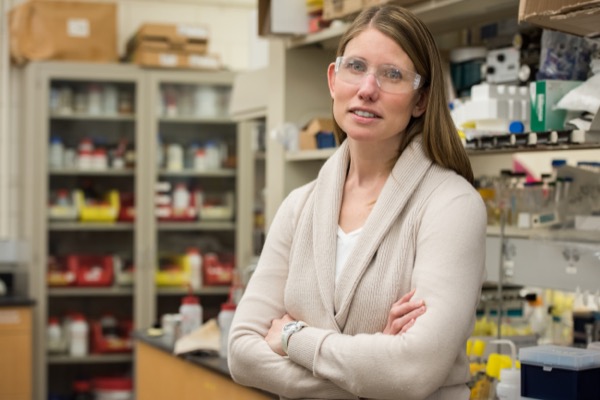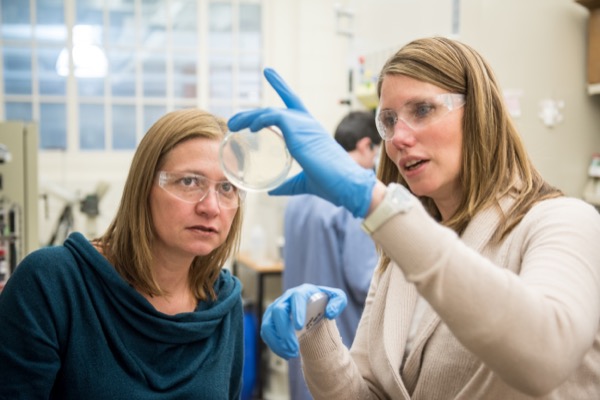


Scientist and scholar
Bioorganic chemist Leimkuhler Grimes wins NSF Career Award
12:56 p.m., Feb. 24, 2016--Chances are your body's immune system is saving your neck again right now, working quietly in the background to defeat whatever viruses, bacteria, fungi or other enemies have gotten into you.
However, the system needs to protect you while a trillion good bacteria reside in or on your body. It's an important balance to maintain.
Honors Stories
National Medal of Science
Warren Award
Catherine Leimkuhler Grimes, assistant professor of chemistry and biochemistry at the University of Delaware, has been studying the immune system for several years, especially its capacity for identifying enemy forces. How do cells distinguish between harmful bacteria and helpful bacteria?
The work is critical for global health, with treatment-resistant bacteria a growing concern and long-term immune system problems such as Crohn's disease, lupus, and irritable bowel syndrome increasingly common.
Grimes' research requires sophisticated analysis of proteins and their role in identifying bacterial threats. Specifically, she is trying to learn how a class of unstable proteins is able to sense the presence of bacteria. Her laboratory is investigating how the immune systems of humans and yeast are triggered when they encounter certain fragments of bacterial cell walls.
Grimes finds it fascinating that the yeasts that live inside the human body have developed “hands,” or receptors, to grab the fragments of bacterial cell wall that resemble the human receptors.
Now the National Science Foundation (NSF) has recognized the promise of Grimes' research with a five-year, $750,000 Faculty Early Career Development Award, one of the most prestigious such grants available to young scientists.
Grimes and the student researchers in her lab are now working to define the differences between the human and yeast systems. Using new biochemical techniques, her team strives to unveil the recognition mechanisms.
“I feel extremely lucky to work with such a dynamic group of students," Grimes said. "They are as committed to these problems as I am. We truly work as a team.”
Her team collaborates with a number of chemists at UD, including the laboratories of Brian J. Bahnson and Tatyana Polenova to gain structural information, as well as a yeast geneticist at Villanova University, Dennis Wykof.
A major goal of the NSF is to establish scientific outreach. Grimes has teamed up with Jennifer Gallo-Fox, assistant professor of human development and family studies, to develop science curriculum that teachers can use with children from pre-kindergarten through second grade.
"A lot of early childhood teachers are anxious about their knowledge of science and their ability to teach science," Gallo-Fox said.
"Part of our goal is to create a network of mentors," Gallo-Fox said, connecting teachers with scientists and researchers in a partnership that supports classroom instruction.
Grimes and her students will be a great help to them, she said.
"I want the early educators to feel empowered and confident," Grimes said.
Gallo-Fox is a researcher in the field of teacher education who teaches the early childhood education course on science methods. Her focus is on helping early childhood educators teach effectively. She and Grimes hope to draw liberally on each other's expertise in this new endeavor.
Gallo-Fox estimates that by the end of the five-year grant, their collaboration will impact science instruction for more than 12,000 children.
The collaboration will also develop “hands-on” projects teachers can use in their classrooms using accessible, household materials.
Grimes and Gallo-Fox are in the early stages of project development and have been working on a project that will demonstrate the growth of bacteria and how scientists study things they cannot see.
"Students often get textbooks and think what's in there was always known," Grimes said. "But at one point, those things were not known. Two sentences in that textbook may represent someone's whole [research] career."
The fact that important new discoveries are being made – in Grimes' lab and many others – adds energy and power to the work and puts students in the middle of solving real problems.
Article by Beth Miller
Photos by Evan Krape









